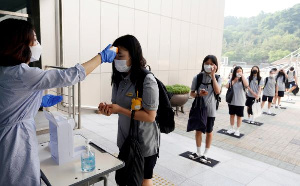 COVID-19 cases keep rising in Ghana and the world at large
COVID-19 cases keep rising in Ghana and the world at large
Since the emergence of this global pandemic called COVID-19, the disease has had a plethora of effects on the global population. The affected sector includes education, economics, religion, festivity among others. This has been a great burden to the global community. The cases keep on increasing on daily basis and for that matter has lessened our human activity. Education being a key area in a country’s development cannot be left out. In the face of a pandemic, work must still go on because the people must be able to cater to their basic needs.
This piece of writing is to draw attention to the necessity of the educational sector in the face of the pandemic. Critical focus needs to be on our educational system. COVID-19 has caused a change in the academic calendar of our educational system and has put pressure on the academic calendar. When schools were shut down last year and students were introduced to e-learning, there were shortfalls and complaints.
One of the critical challenges is the lack of access to internet bandwidth for students in various institutions. This is the time our educational system has to embrace the use of Information Technology.
Now, we have our students on campus and the disease is on the rise. The University Management needs to make our Wireless Fidelity (WiFi) very strong on campus to let students get access to it even in their halls of residence. Universities can switch to 80% online learning with the help of Zoom, Google Meet, Moodle and other platforms. This can be facilitated when they have accessibility to use WiFi on campus. This can help in the control of the spread of the disease on campus.
The University Management should ensure the WiFi is working for students for conducive learning in the halls and hostels. When this online lecture begins, at least at the end of the month, lecturers can meet students face-to-face for discussion. Universities and other institutions should make use of Information Technology to help reduce the spread of the disease to ensure that the students are safe.
Authors:
Benjamin Kwame Oduro
University of Cape Coast
Bridget Asamoah Boafoah
Dept. Population and Health, UCC
